Zeus : Master of Olympus
Review - city-building ancient Greek style, from the creators of Caesar and Pharaoh
Like a lightning bolt from Zeus' fingers, so does Sierra bestow upon us the latest in Impressions' series of ancient civilisation management games, "Zeus : Masters of Olympus". But unlike the fiery wrath of a deity, this is something that the average Joe or Theo looks forward to. With a rich pedigree in the strategy-building field, Impressions' titles usually pick up much critical acclaim, and thankfully Zeus is no exception.
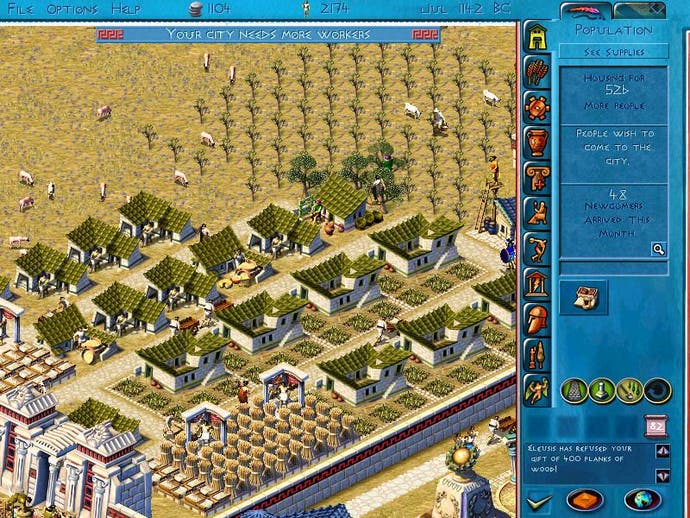
Build
Anyone familiar with the strategy titles of the last few years will recognise Zeus very quickly; its isometric display and city-based strategy mirror the earlier games of the series such as "Caesar" and "Pharaoh". This is, of course, no bad thing, the previous games being amongst the leaders in their chosen field. But while Zeus retains the city building and management elements of the previous games, it replaces the elaborate temple and pyramid building of Pharoah with hero-driven campaigns and mythological encounters, with a little bit of armed combat for good measure.
But while games like the "Age of Empires" series are combat-centric, with economic facets included as an afterthought, Zeus definitely takes the opposite approach. The combat can be described as cumbersome at best, and maddening at worst. Since there is no drag selection option or any decent hotkey setup for combat, you find yourself furiously clicking between your unit's standard at the palace - the only way to reliably select troops - and where you want them to gather. After a period of deliberation, the little soldiers comply, by which time the opposing army is probably already halfway down the road with your amphorae...
Thoughtfully Impressions have included an auto-combat feature this time round, which offers the chance to let the AI control your various battalions, but sadly it is fairly unreliable. The first time I tried it I found my troops mooching around the southern wall of my city discussing the relative merits of Cypriot olives over mainland ones, as the invaders let themselves in around 500 paces away to the right, slaying little water-carriers and philosophers left, right and kentron.
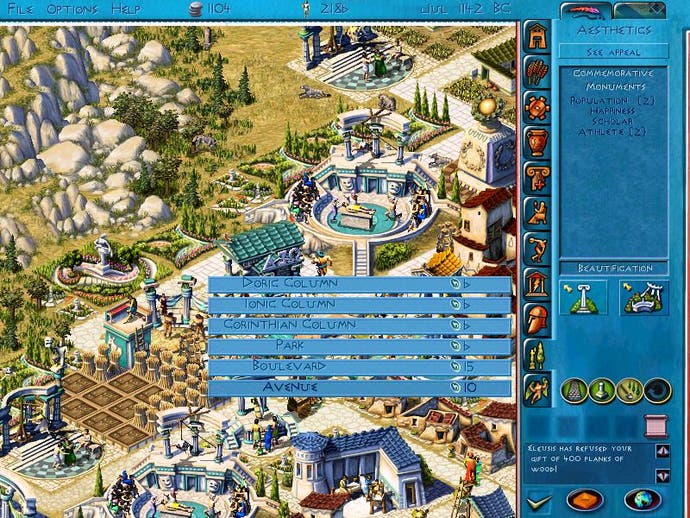
Merchandise
Then again, Zeus never set out to win any awards for its combat features - it's the city management where this game really shines. And shine it does. Like the most complex of Greek wines, it's an expert blend of styles and flavours.
Your people desire a large array of merchandise; food, wine, fleece, pottery, sculptures and weapons can all be sold at your city's Agoras. Of course, these valuable commodities don't come out of thin air, you will need to either produce or import them. The number of possibilities for keeping the resources balanced is staggering. Find some decent farmland and you can plant olive groves or grapes for wine, rear goats for cheese and sheep for wool, or grow root vegetables or corn.
Water has to be extracted from fountains and then distributed accordingly, and clay and marble can be manufactured into pottery and sculptures, while bronze and silver mines must be constructed to keep your mints and armouries in business. If your surroundings are rocky and don't lend themselves to farming, trade routes can be established by land and sea to import and export as you see fit, swelling or depleting your city's drachma reserves. It's imperative to keep your little Hellenic people stocked with all the materials they need for a happy, healthy life, so that they can serve as workers or soldiers. The task of building, managing and maintaining is thoroughly engrossing, and although the missions are hard and time consuming, you will barely notice the hours fly past.
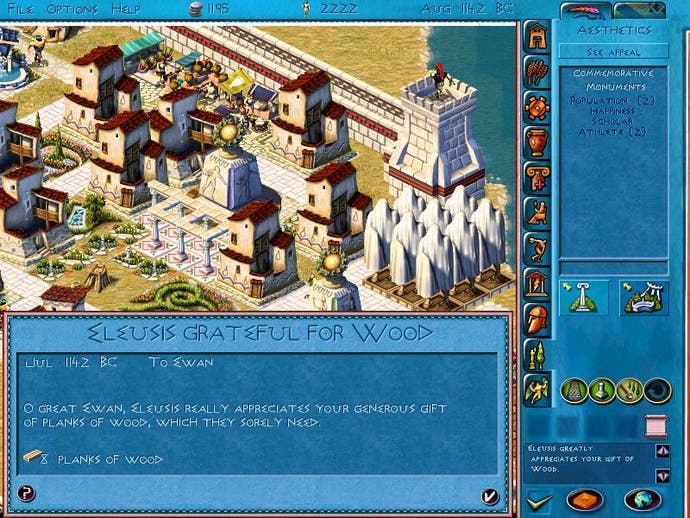
Body And Soul
But tangible objects alone can't keep your city satisfied. Pursuits of the body, soul and mind are needed if your city wants to rank top dog in ancient Greece. Drama schools and colleges must be built to supply your Theatres and Podiums with budding thespians and philosophers, to keep the intelligence of your populace high.
For the more physically-minded, Gymnasiums can be built to supply your arenas with competitors to run around and wrestle naked. The elite of Greek society can be entered into annual tournaments for any of the three artistic disciplines, and of course the main event of the year will judge your city in all three. Winning these tournaments rewards your city with obelisks that can be erected anywhere in town, boosting the appeal of the local area. These staples of Greek society lend a feeling of authenticity to the game that is both refreshing and impressive.
In keeping with the spirit of Ancient Greece, all of the campaigns available are based upon events from Greek mythology. You can follow eight different campaigns through Greek history, varying from the adventures of Jason and his Argonauts to the construction of Athens. Furthermore, a lot of the missions involve the summoning of a Greek hero such as Hercules to aid you in battle. The hero will only help you if you meet various criteria, like getting enough resources, winning Olympic games, or acheiving a certain population. However, upon completing these goals, the hero will proceed to smite any Minotaur, Harpy or whatever it is that has been making your city's life a living Hades for the last few months, and everyone goes home happy with a crate of Athenian wine.
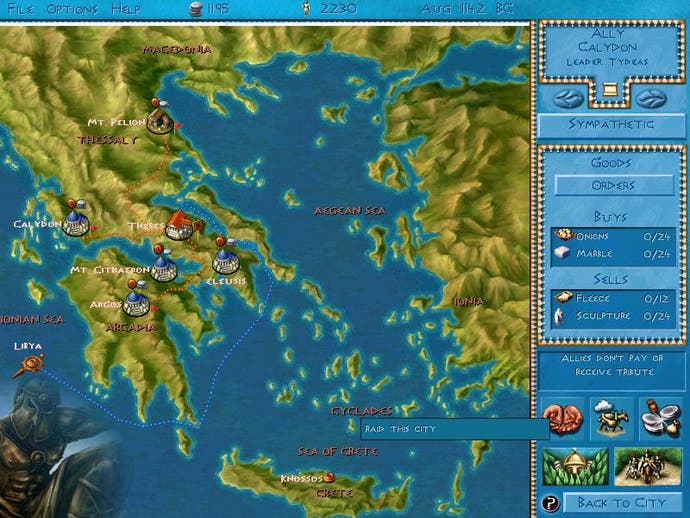
Sonic
The whole game has a most polished feel to it, with the isometric 2D view suiting the game very well. Resisting the common trend of switching to a 3D engine, Impressions persevered with a similar interface to the previous games in the series, with great results.
Guards stroll, actors stride, and all the other people in the city move and interact with buildings with great detail. Each building has its own animations, such as the stomping of olive pressers or the exertion of gladiators. Warehouses and granaries raise and deplete stock levels, their wares visible for a quick check on resources. Above all, it is strangely uncluttered for a 2D game, and if you are having trouble finding something you can rotate the camera four ways, enabling those hard-to-reach ghettoes of the city to get the care they deserve.
The sound is yet another great feature. Right click on a worker on the street and you will get a little soundbite of what he or she thinks of your city. My personal favourite is clicking a guard during quiet times. He says, in a cool-as-a-cucumber American cop accent, "Unrest in my city? Shut yo' mouth! Things are peaceful here!". The various little bits of local colour had me actively seeking out citizens to hear what they had to say. The only let down in the audio department is the music during menu scenes and so on, which is for the most part generic strategy fare, although tolerable. But with such an excellent game to backup the superficial, it's not a big deal.
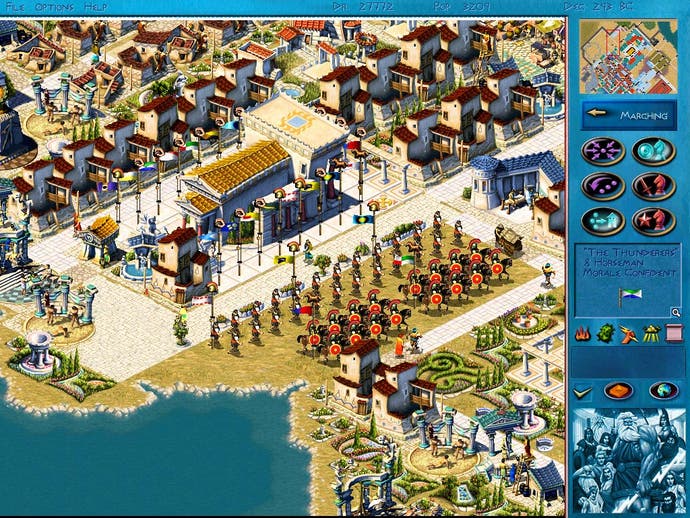
Conclusion
As is to be expected from this series, Impressions have struck gold yet again with an updated strategy classic. If you are not a strategy fan by nature you will probably still love the city building aspect in Sandbox mode, where you can build to your heart's content. And for the genre enthusiast, there is more than enough to keep you entertained for the long haul.
If you are looking for a festive thinker to play in between consuming copious amounts of booze, this will be ideal, although I wouldn't recommend playing it with a hangover. A thoroughly addictive, engrossing game that ranks among my top five for this year.
-
